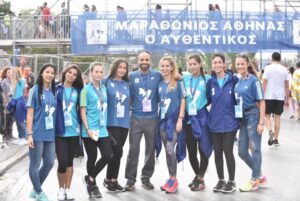
During the Athens Marathon, several sustainability and environmental initiatives were implemented, such as a Green Teams volunteering program, recycling programs, mitigating waste and reducing the carbon footprint of the event altogether. This project also collaborates with the United Nations Environment Program to raise awareness about the Mediterranean Action Plan which focuses on strengthening the region’s physical environment and contributing to sustainable development.
Objectives:
- Expand community involvement in sustainability efforts
- Reduce the environmental footprint of the Athens Marathon
- Reduce overall waste and pollution following the event
- Contributing to sustainable development
Description of the practice:
Before the Athens Marathon, some volunteers were invited to participate through the Green Teams Initiative, a group responsible for collecting and recycling items during and after the marathon like plastic. During the event, the volunteers also provided free water bottles rather than single-use plastic cups. Additionally, several recycling bins were also placed around the city. Finally, the volunteers to the project also helped create different reuse schemes, not only for water bottles for sneakers, running shoes and other training equipment and sportswear.
Impacts & Results:
- Reduction of Environmental Footprint
- Waste Reduction and Recycling
- Community Engagement and Awareness
- Innovative Sustainability Practices
Conclusion & suggestion for youth workers:
The sustainability of the Athens marathon shows how creative we can be in terms of promoting environmental sustainability and reducing our carbon footprint. Recycling and reusing equipment is a consistent measure we can also strive for. But reusing, and handing in old sports clothes and shoes is a creative way to help each other, reduce costs, and promote sustainability. This is likely applicable to much of the material we use within our organisations. When printing new stickers, merch and so on, we must think of the long-term use rather than designing and consistently consuming new things all the time – which hurts our pockets as well as the environment. What we can learn from the Green Teams Initiative is that community involvement and inclusivity is a fantastic tool to reach sustainability objectives. Protecting the environment and promoting sustainability is a goal most of us can stand behind, this unites people and can provide a lot of sense of community, friendship and motivation.
 .
. 
